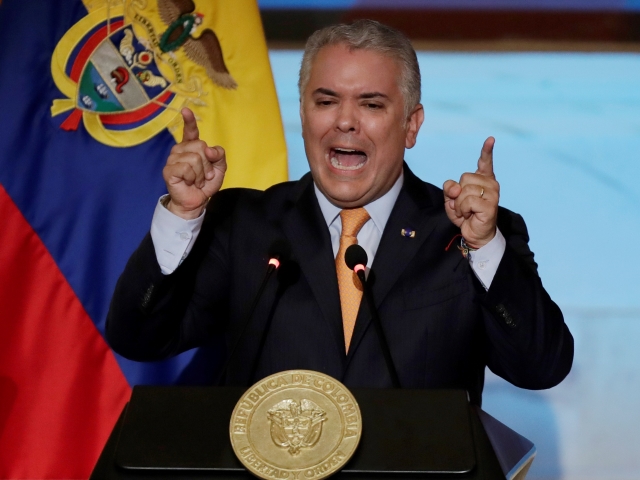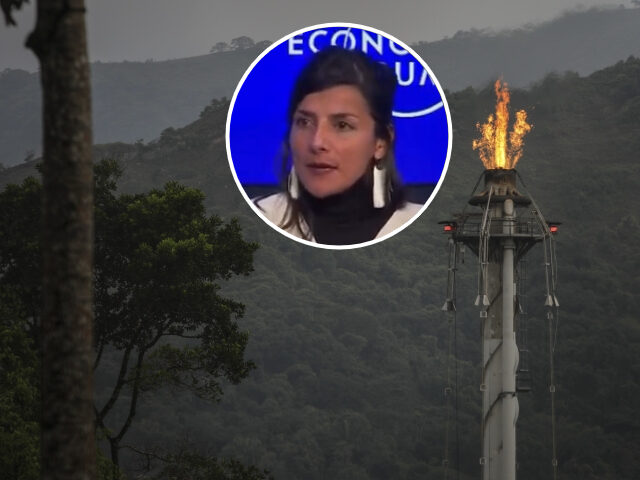Energy Minister Irene Vélez of Colombia confirmed on Thursday that the South American nation will stop awarding new oil and gas exploration contracts, a decision that she described as “absolutely urgent.”
Vélez made her announcement at the gathering of the World Economic Forum in Davos, during a panel titled “The Different Roads to Energy Transition.” The Colombian minister’s statement follows far-left President Gustavo Petro proposing at the same venue to “decarbonize capitalism” to “prevent the planet’s extinction.”
“We decided that we are not going to grant new gas and oil exploration contracts,” Minister Vélez said, adding, “importers of coal will no longer be importing very soon.”
“This has, of course, been very controversial at the national level, but for us it is a clear sign of our commitment to the fight against climate change,” Vélez continued. “We know that this decision, which is a planetary decision, is absolutely urgent.”
Mere days after assuming office, Petro’s far-left government — the first in the nation’s history — expressed its intention of halting all new contracts for natural gas exploration and production in the name of “environmental justice,” which would effectively end Colombia’s self-sufficiency in the pursuit of “green” energies. At the time, Vélez suggested that, should his policies result in natural gas shortages, Petro would buy the fossil fuel from the neighboring socialist regime of Venezuela.
Despite oil and coal being some of Colombia’s top exports, Petro, a former member of the Marxist M19 guerrilla, has continuously waged a fierce campaign against them, going as far as to claim that they are “more poisonous” than cocaine in several opportunities. Petro promoted cocaine, dismissing its toxic properties, during his first U.N. General Assembly speech in September 2022.
Petro’s government has also slammed Colombia’s oil, coal, and gas industries with higher taxes as part of his ambitious tax reform, approved by Colombia’s Congress in November.
Petro stood by minister Vélez’s statements this week, expressing at Davos that “part of what we have come here to do specifically has to do with replacing the Colombian export matrix.”
The far-left president also claimed that Colombia will bet on tourism to fill the void in revenue that suspending oil and gas contracts would generate.
“Basically, it has to do with tourism and export of clean energy,” Petro said. “We are convinced that a strong investment in tourism, given the beauty of the country, and in the capacity and potential that the country has in clean energy generation could perfectly, in a short term, or in a transition, fill the gaps that the fossil economy can leave, on which we depended.”
Upon his arrival in France, Petro ensured that current active oil and gas contracts would remain active.
The energy minister’s statements instantly drew a barrage of criticism from Colombia’s politicians. Petro’s predecessor, Iván Duque, reacted to the announcement by describing it as an “economic suicide.”

Colombia’s former President Ivan Duque delivers a speech during the inauguration of the congressional session in Bogota, Colombia, Wednesday, July 20, 2022. (AP Photo/Ivan Valencia)
“It simply means a kind of economic and social suicide,” Duque said. He noted that oil and gas represent 40 percent of Colombia’s exports and 30 percent of foreign investment.
“They are one of the main sources of market capitalization in our stock market and it is one of the main sources of foreign currency for our economy, and there are no products that can replace such a weight in the short and medium term,” Duque explained.
“If exploration stops, the message we are giving investors around the world is that Colombia’s main source of income is going to disappear and that is going to generate uncertainty, concern, and a large outflow of capital from our country. It is necessary to prevent these messages from being given, because they are wrong messages and have nothing to do with the energy transition,” the former president concluded.
The Colombian Association of Oil and Gas (ACP) also reacted to the minister’s statements by warning that Colombia could become impoverished without new oil exploitation contracts.
“The hydrocarbon industry is essential for the economic stability of the country, national financing and that of the departments and municipalities,” Francisco Lloreda, ACP’s president stated. “About 40 percent of exports depend on this sector, 20 percent of the nation’s tax revenue and 76 percent of royalties.”
Lloreda, through his Twitter account, noted that, while Vélez and Petro denounced oil and gas, Felipe Bayón, the president of the Colombia’s state-owned Ecopetrol oil company, stood in defense of the use of hydrocarbons at Davos. Bayón contradicted Vélez, affirming that Colombia should continue exploring and producing oil and gas.
Quién entiende al Gobierno: mientras el Presidente de Ecopetrol afirma en Davos-Suiza, que el país debe seguir explorando y produciendo petróleo y gas, en línea con el Min Hacienda, la Min Energía dice que no habrá nuevos contratos de exploración. ¿Al fin que?
— FcoLloreda (@FcoLloreda) January 19, 2023
“Who understands the government? While the President of Ecopetrol affirmed in Davos, Switzerland, that the country must continue exploring and producing oil and gas, in line with the Ministry of Finance, the Ministry of Energy says that there will be no new exploration contracts. So, in the end, what?” he wrote.
Federico Gutiérrez, a conservative candidate who lost against Petro in the first round of the 2022 presidential election, described both Petro and Vélez as “irresponsible.”
La irresponsabilidad del gobierno Petro y su ministra de Minas y Energía no tiene límites.
Condenan a Colombia a tener que importar gas de Venezuela.
Condenan a los más pobres a pagar más por el gas y combustibles.
Transición energética SÍ, pero de manera responsable. pic.twitter.com/DfVI7sjUIH— Fico Gutiérrez (@FicoGutierrez) January 19, 2023
“The irresponsibility of the Petro government and its Minister of Mines and Energy has no limits,” Gutiérrez wrote on Twitter. “They condemn Colombia to have to import gas from Venezuela. They condemn the poorest to pay more for gas and fuel. Energy transition yes, but in a responsible way.”
Christian K. Caruzo is a Venezuelan writer and documents life under socialism. You can follow him on Twitter here.

COMMENTS
Please let us know if you're having issues with commenting.